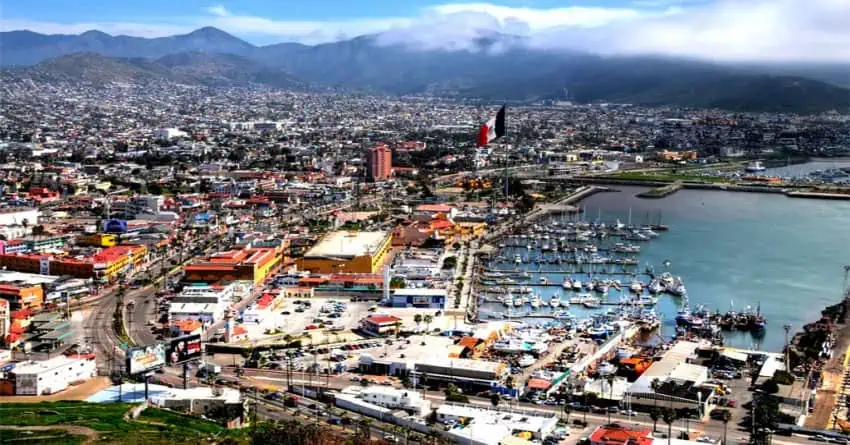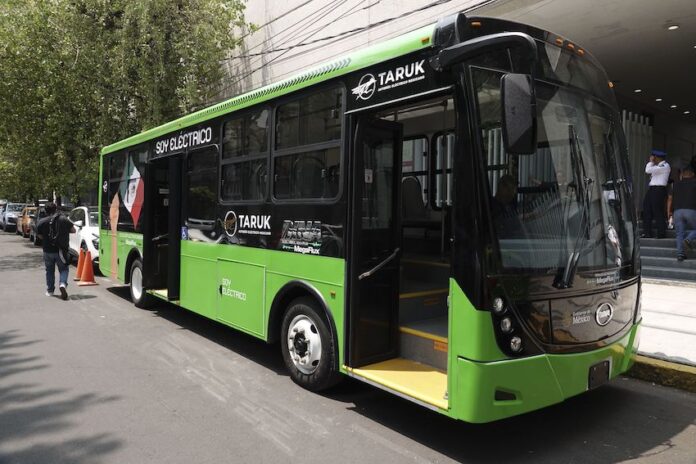Mexico introduced the Taruk on Tuesday, an electric bus that is the nation’s first domestically manufactured electric vehicle (EV).
Its name means “roadrunner” in the Indigenous Yaqui language.

Fostering efficient and economically viable projects
The vehicle was developed by the Mexico automaker Dina and the EV conversion firm Megaflux, with support from the National Council of Humanities, Science and Technology (Conacyt) and the National Autonomous University of Mexico’s School of Engineering.
Economy Minister Marcelo Ebrard presented Taruk at a press conference where he announced the first units will operate in the port city of Ensenada in Baja California.
The electric vehicle has a capacity of 60 passengers, half seated and the other half standing, Ebrard said.
Coordinator of the Economic Development Advisory Council Altagracia Gómez Sierra, Megaflux CEO Roberto Gottfried, the Mobility Minister Daniel Sibaja and Ensenada’s mayor Claudia Agatón also attended the event.
“It takes months of testing, adjustments, trial and error, improving its performance, the number of kilometers of autonomy, and increasing its efficiency compared to any other electric vehicle in Asia or any other region of the world,” Ebrard said at the event.
“And the Mexican one is better. It’s not just about supporting Mexican developments but rather ensuring that they are efficient and economically viable.”

The engine was developed in Iztapalapa, in the south of Mexico City. There are currently no other EVs with Mexican engines, making the launch of the Taruk a technological milestone, said Ebrard.
Mexico exports over 1 million vehicles a year to the United States and is the sixth-biggest exporter globally but is not known internationally for its car brands.
Ebrard awarded the “Made in Mexico” certification to Taruk, a program that falls under President Claudia Sheinbaum’s Plan México national investment initiative that seeks to grow Mexico’s GDP, provide more jobs and expand underdeveloped and new industries in the country.
Mexico’s space agency, for example, a signatory of NASA’s Artemis Accords, is also collaborating with the U.S. space agency on nanosatellite technology demonstrators that will contribute to the future of space exploration.
In 2024, Mexico successfully launched nanorobots to the moon in its first lunar mission — dubbed Proyecto Colmena — from NASA facilities in Cape Canaveral, Florida. While a malfunction in the U.S.-built lunar lander carrying the robots prevented a soft landing on the moon, the robots did function correctly in deep space, proving the project’s viability.
Mexico is also making progress in the production of vaccines, semiconductors and messenger RNA-based therapies.
“We can do anything we set our minds to,” Ebrard said at the event.
Economic uncertainty
Ebrard announced during the event his plans to travel to Washington, D.C. on Wednesday to continue economic and trade negotiations with the United States.
“We are facing the complex issue of what the future of the relationship with the United States will be, not politically but economically. Mexico exports more than a million vehicles to the United States, and today the discussion is about what future that model will have,” he said.
The launch of Taruk is important given the increasing trade pressure from the U.S., which is threatening to impose 25 percent tariffs on Mexican goods starting April 2, Ebrard stressed.
With reports from Expansión and La Jornada
